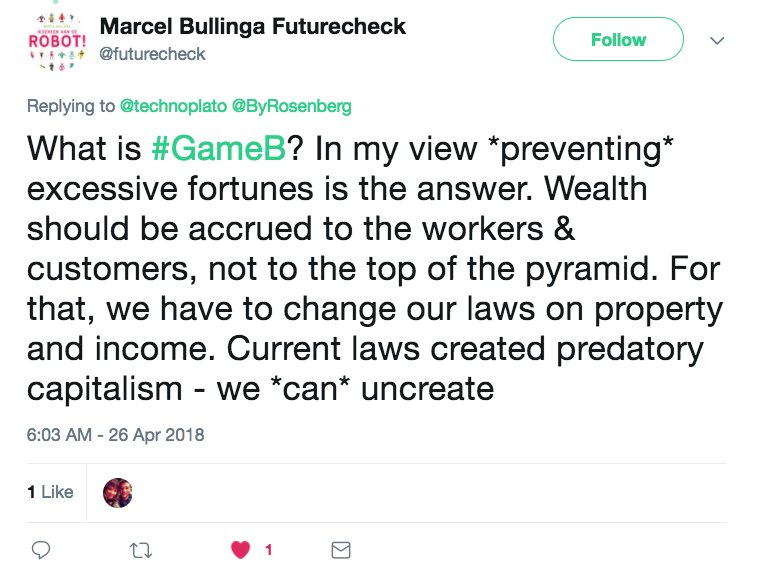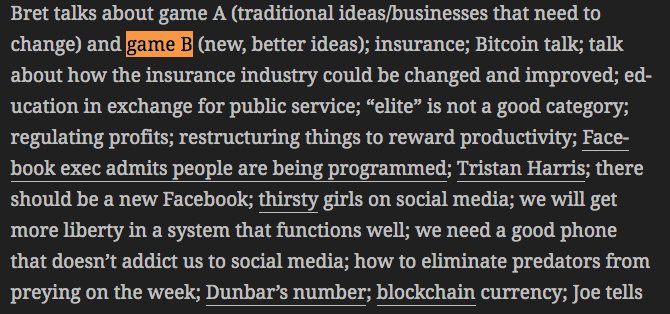I was just asked 'What is #GameB?'
This is a great question that I don't think there exists a great answer for. @BretWeinstein and @EricRWeinstein coined the term and it stuck (I think more than they intended)
I first heard the term #GameB in @joerogan's Joe Rogan Experience
This is a great question that I don't think there exists a great answer for. @BretWeinstein and @EricRWeinstein coined the term and it stuck (I think more than they intended)
I first heard the term #GameB in @joerogan's Joe Rogan Experience

Here's a link to the episode's unofficial notes: jrefan.com/the-joe-rogan-…
Here's roughly where @BretWeinstein begins talking about what gets him to #GameB:
Here's roughly where @BretWeinstein begins talking about what gets him to #GameB:

In my best efforts, I would describe #GameB as the following set of statements:
The current game we play as humans is #GameA.
GameA has certain 'rules' set in place. It's hard to describe them all, but a good summary could be 'Our current set of laws and social norms.'
The current game we play as humans is #GameA.
GameA has certain 'rules' set in place. It's hard to describe them all, but a good summary could be 'Our current set of laws and social norms.'
#GameB is an ideology whereby we can play by the exact same rules as GameA without changing any laws, but we end up with a greater net positive for every actor in the system at the detriment of no other positive actors in the system. The game becomes one of positive sums.
~~~ My thoughts (everything below this Tweet) ~~~
I believe #decentralization is key as a catalyst in #GameB. Without it, centralized power structures will always tend towards benefitting themselves rather than the hole.
I believe #decentralization is key as a catalyst in #GameB. Without it, centralized power structures will always tend towards benefitting themselves rather than the hole.
I believe we should not change laws, but rather perhaps paradoxically, create MORE #Competition in order to compete with our current 'Game'. Here's an example of what I mean.
Suppose, for instance, that we are able to somehow create a mechanism by which open source developers and perpetually compensated for contributions to open source projects based on the usage of their particular contributions.
Suppose also that we have an open source protocol (no individual or group benefits from it's usage similar to HTTP) voluntary-entry reputation system online that is ubiquitous. We can subjectively measure positive additions to systems in that way based on the way a user feels
an arbitrary application impacts their life or work in a positive way. We can then make a collectively scientific and measurable determination as to whether or not a given software system has a positive impact on an end user or a negative impact.
In this way, we promote software systems where the end users determine what impact a system has as that will directly impact the developing group of the software's compensation.
A valid hypothesis would follow that something such as Facebook, (or any other information monopolizing framework that trades data for ads $$$) would have a negative impact on society at large because their current capitalistically incentivized goal does not align very well with
the betterment of society. Not only is that betterment largely unmeasurable, but we can find abundant examples where it has been determined that these sites and methods of unbounded growth are NOT GOOD for society as a hole and in fact quite detrimental.
The solution lies in an open sourced & transparent software system where the user chooses how their information is delivered to them and to those who are interested in 'following' them. If 'truth' and journalistic first principles are economically incentivized, then these actors
would seek them out rather than simply nonsense that grabs attention of those who #Facebook wants to target with advertisements and manipulate them into thinking they 'need' a thing.
Such a system would also serve to move our economic incentives away from unbounded growth and rather to explore that which we find valuable instead.
#HumanFulfillment #PursuitOfHappiness
#HumanFulfillment #PursuitOfHappiness
I hope that's helped to explain a little bit about my thoughts on #GameB as well as what I feel is a fair denotation of the term. I'll attempt to define the term again below so as to serve as another representation. Would love to hear any thoughts or feedback.
#GameB: 'Playing the current human game by the same rules in a way that outcompetes practices that are not beneficial to the ethical, altruistic, or fulfilling advancement of humanity by identifying and offering better solution to current practices that aren't doing so.'
cc @telos @MadLambx @MattPirkowski @BretWeinstein @EricRWeinstein @RubinReport @JBuckets618 @jgreenhall @nathanwaters
#unroll unroll
• • •
Missing some Tweet in this thread? You can try to
force a refresh




